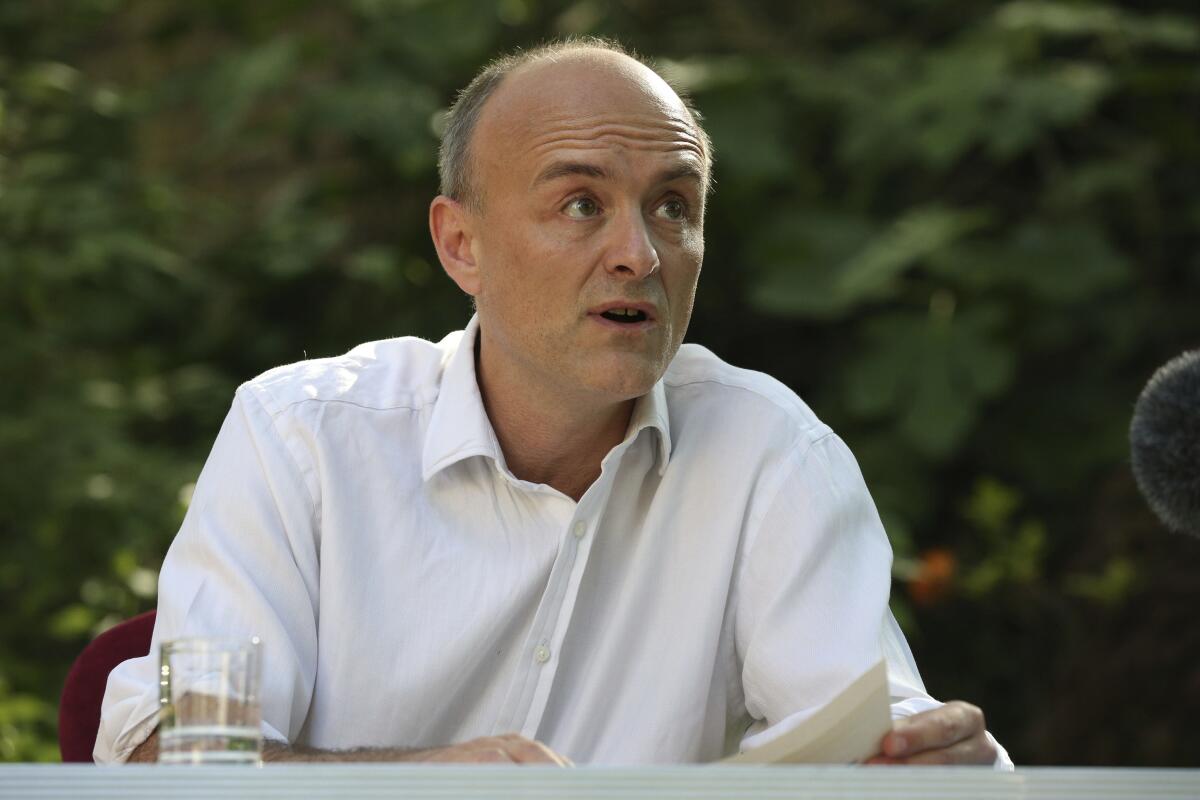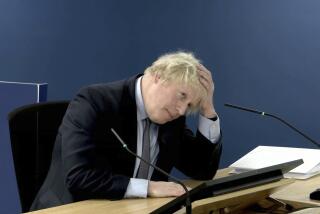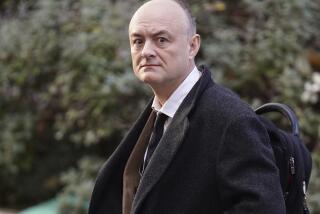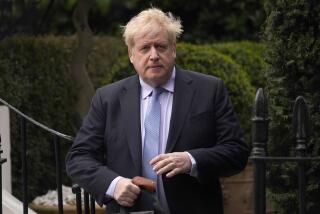Aide to U.K. leader took a road trip during lockdown, says he not resigning

- Share via
LONDON — British leader Boris Johnson’s powerful chief aide insisted Monday that he wouldn’t resign for driving the length of England while the country was under strict lockdown — a trip he made without informing the prime minister first.
The government is facing a tide of anger from politicians and the public over the revelation that Dominic Cummings traveled more than 250 miles from London to his parents’ home in Durham, in northeast England, at the end of March.
Cummings said he traveled so that extended family could care for his 4-year-old son if he and his wife, who were infected with the coronavirus, both fell ill.
His trip came after the government imposed a strict stay-at-home order, and Cummings is being accused of having flouted rules that he expected the rest of the country to follow. Many Britons have taken to social media and radio phone-ins to recount how the lockdown had prevented them from visiting older relatives, comforting dying friends or attending the funerals of loved ones.
In a televised news conference in the garden of 10 Downing St. — all but unheard of for an unelected advisor — Cummings tried to quash the controversy with a detailed but unrepentant account of his movements.
Cummings insisted that “the rules … allowed me to exercise my judgment” and that his need to ensure childcare for his son was an “exceptional situation.”
“I don’t regret what I did,” he said, though he acknowledged that “reasonable people” might disagree with his actions.
Cummings said he didn’t tell the prime minister, who had just been diagnosed with COVID-19, about his decision to leave London, because “he was ill himself, and he had huge problems to deal with.”
“Arguably this was a mistake,” Cummings said.
Johnson has stood by Cummings, saying he “followed the instincts of every father and every parent.”
A self-styled political disrupter who disdains the media and civil service, the 48-year-old Cummings has been essential to Johnson’s rise to power. He was one of the architects of the successful campaign to take Britain out of the European Union and orchestrated Brexit champion Johnson’s thumping election victory in December.
Five months after that triumph, Johnson’s government is facing criticism for its response to a pandemic that has hit Britain harder than any other European country. Britain’s official COVID-19 death toll stands at 36,793, the second-highest confirmed total in the world after that of the United States.
The coronavirus laid low several senior U.K. officials, including Cummings, Health Secretary Matt Hancock and Johnson himself, who spent several days in intensive care at a London hospital in April.
The U.K. is gradually easing its lockdown, allowing more outdoor recreation and letting some shops and businesses reopen.
But as Johnson gathered his Cabinet on Monday to discuss plans to reopen schools and more stores starting June 1, the Cummings scandal showed no signs of dying down.
Stephen Reicher, a social psychologist who sits on a group advising the government, said “more people are going to die” because the episode would undermine adherence to the lockdown rules.
Several senior Church of England clergy joined in the criticism. Bishop of Manchester David Walker called for “clear repentance, including the sacking of Cummings.”
Ominously for Johnson, a growing number of Conservative lawmakers also criticized Cummings. Member of Parliament Paul Maynard said the aide’s actions were “a classic case of ‘do as I say, not as I do.’ … It seems to me to be utterly indefensible and his position wholly untenable.”
Cummings, who usually exerts power from the sidelines, looked uncomfortable but didn’t admit fault during a live media grilling that lasted more than an hour.
He said that people felt “understandable anger” but insisted much of it was “based on reports in the media that haven’t been true.” He confirmed, however, most of the details in media reports of his travels, including the journey to Durham and a later drive to a nearby town on April 12.
“I don’t think there is one rule for me and one rule for other people,” he said, insisting he had done what he thought was right at the time.
He said he hadn’t considered resigning.
More to Read
Sign up for Essential California
The most important California stories and recommendations in your inbox every morning.
You may occasionally receive promotional content from the Los Angeles Times.










